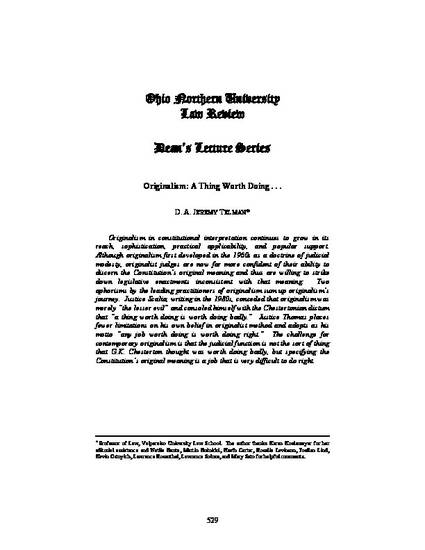
Article
Originalism: A Thing Worth Doing . . .
Ohio Northern University Law Review
(2016)
Abstract
Originalism in constitutional interpretation continues to grow in its reach, sophistication, practical applicability, and popular support. Although originalism first developed in the 1960s as a doctrine of judicial modesty, originalist judges are now far more confident of their ability to discern the Constitution’s original meaning and thus are willing to strike down legislative enactments inconsistent with that meaning. Two aphorisms by the leading practitioners of originalism sum up originalism’s journey. Justice Scalia, writing in the 1980s, conceded that originalism was merely “the lesser evil” and consoled himself with the Chestertonian dictum that “a thing worth doing is worth doing badly.” Justice Thomas places fewer limitations on his own belief in originalist method and adopts as his motto “any job worth doing is worth doing right.” The challenge for contemporary originalism is that the judicial function is not the sort of thing that G.K. Chesterton thought was worth doing badly, but specifying the Constitution’s original meaning is a job that is very difficult to do right.
Keywords
- Justice Scalia,
- Justice Thomas,
- originalism,
- textualism,
- intentionalism,
- judicial activism,
- legal history,
- interpretation
Disciplines
Publication Date
2016
Citation Information
D. A. Jeremy Telman. "Originalism: A Thing Worth Doing . . ." Ohio Northern University Law Review Vol. 42 (2016) p. 529 - 567 Available at: http://works.bepress.com/jeremy_telman/35/
